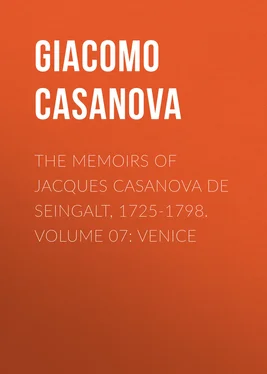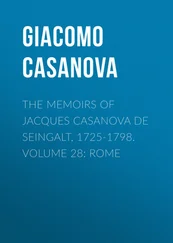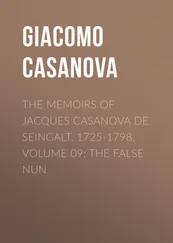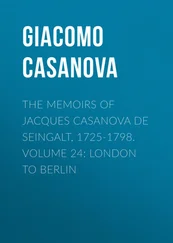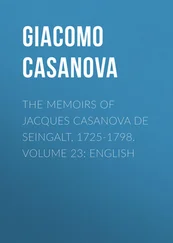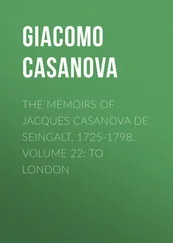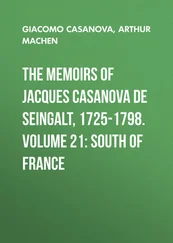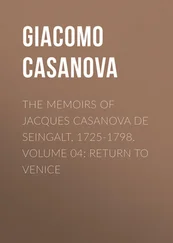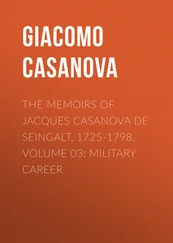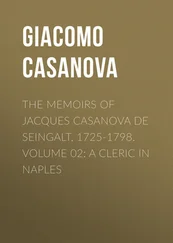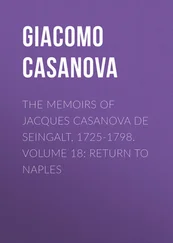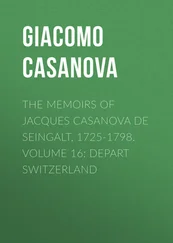Giacomo Casanova - The Memoirs of Jacques Casanova de Seingalt, 1725-1798. Volume 07 - Venice
Здесь есть возможность читать онлайн «Giacomo Casanova - The Memoirs of Jacques Casanova de Seingalt, 1725-1798. Volume 07 - Venice» — ознакомительный отрывок электронной книги совершенно бесплатно, а после прочтения отрывка купить полную версию. В некоторых случаях можно слушать аудио, скачать через торрент в формате fb2 и присутствует краткое содержание. Жанр: Биографии и Мемуары, История, foreign_edu, foreign_antique, foreign_prose, на английском языке. Описание произведения, (предисловие) а так же отзывы посетителей доступны на портале библиотеки ЛибКат.
- Название:The Memoirs of Jacques Casanova de Seingalt, 1725-1798. Volume 07: Venice
- Автор:
- Жанр:
- Год:неизвестен
- ISBN:нет данных
- Рейтинг книги:5 / 5. Голосов: 1
-
Избранное:Добавить в избранное
- Отзывы:
-
Ваша оценка:
- 100
- 1
- 2
- 3
- 4
- 5
The Memoirs of Jacques Casanova de Seingalt, 1725-1798. Volume 07: Venice: краткое содержание, описание и аннотация
Предлагаем к чтению аннотацию, описание, краткое содержание или предисловие (зависит от того, что написал сам автор книги «The Memoirs of Jacques Casanova de Seingalt, 1725-1798. Volume 07: Venice»). Если вы не нашли необходимую информацию о книге — напишите в комментариях, мы постараемся отыскать её.
The Memoirs of Jacques Casanova de Seingalt, 1725-1798. Volume 07: Venice — читать онлайн ознакомительный отрывок
Ниже представлен текст книги, разбитый по страницам. Система сохранения места последней прочитанной страницы, позволяет с удобством читать онлайн бесплатно книгу «The Memoirs of Jacques Casanova de Seingalt, 1725-1798. Volume 07: Venice», без необходимости каждый раз заново искать на чём Вы остановились. Поставьте закладку, и сможете в любой момент перейти на страницу, на которой закончили чтение.
Интервал:
Закладка:
In Poland, some years afterwards, I saw the same caprice at the coronation of Stanislas Augustus Poniatowski, and the old palatine noblemen almost broke their hearts at the sight of that costume; but they had to shew as good a countenance as they could, for under Russian despotism the only privilege they enjoyed was that of resignation.
The Emperor Francis I. was, handsome, and would have looked so under the hood of a monk as well as under an imperial crown. He had every possible consideration for his wife, and allowed her to get the state into debt, because he possessed the art of becoming himself the creditor of the state. He favoured commerce because it filled his coffers. He was rather addicted to gallantry, and the empress, who always called him master feigned not to notice it, because she did not want the world to know that her charms could no longer captivate her royal spouse, and the more so that the beauty of her numerous family was generally admired. All the archduchesses except the eldest seemed to me very handsome; but amongst the sons I had the opportunity of seeing only the eldest, and I thought the expression of his face bad and unpleasant, in spite of the contrary opinion of Abbe Grosse-Tete, who prided himself upon being a good physiognomist.
"What do you see," he asked me one day, "on the countenance of that prince?"
"Self-conceit and suicide."
It was a prophecy, for Joseph II. positively killed himself, although not wilfully, and it was his self-conceit which prevented him from knowing it. He was not wanting in learning, but the knowledge which he believed himself to possess destroyed the learning which he had in reality. He delighted in speaking to those who did not know how to answer him, whether because they were amazed at his arguments, or because they pretended to be so; but he called pedants, and avoided all persons, who by true reasoning pulled down the weak scaffolding of his arguments. Seven years ago I happened to meet him at Luxemburg, and he spoke to me with just contempt of a man who had exchanged immense sums of money, and a great deal of debasing meanness against some miserable parchments, and he added,—
"I despise men who purchase nobility."
"Your majesty is right, but what are we to think of those who sell it?"
After that question he turned his back upon me, and hence forth he thought me unworthy of being spoken to.
The great passion of that king was to see those who listened to him laugh, whether with sincerity or with affectation, when he related something; he could narrate well and amplify in a very amusing manner all the particulars of an anecdote; but he called anyone who did not laugh at his jests a fool, and that was always the person who understood him best. He gave the preference to the opinion of Brambilla, who encouraged his suicide, over that of the physicians who were directing him according to reason. Nevertheless, no one ever denied his claim to great courage; but he had no idea whatever of the art of government, for he had not the slightest knowledge of the human heart, and he could neither dissemble nor keep a secret; he had so little control over his own countenance that he could not even conceal the pleasure he felt in punishing, and when he saw anyone whose features did not please him, he could not help making a wry face which disfigured him greatly.
Joseph II. sank under a truly cruel disease, which left him until the last moment the faculty of arguing upon everything, at the same time that he knew his death to be certain. This prince must have felt the misery of repenting everything he had done and of seeing the impossibility of undoing it, partly because it was irreparable, partly because if he had undone through reason what he had done through senselessness, he would have thought himself dishonoured, for he must have clung to the last to the belief of the infallibility attached to his high birth, in spite of the state of languor of his soul which ought to have proved to him the weakness and the fallibility of his nature. He had the greatest esteem for his brother, who has now succeeded him, but he had not the courage to follow the advice which that brother gave him. An impulse worthy of a great soul made him bestow a large reward upon the physician, a man of intelligence, who pronounced his sentence of death, but a completely opposite weakness had prompted him, a few months before, to load with benefits the doctors and the quack who made him believe that they had cured him. He must likewise have felt the misery of knowing that he would not be regretted after his death—a grievous thought, especially for a sovereign. His niece, whom he loved dearly, died before him, and, if he had had the affection of those who surrounded him, they would have spared him that fearful information, for it was evident that his end was near at hand, and no one could dread his anger for having kept that event from him.
Although very much pleased with Vienna and with the pleasures I enjoyed with the beautiful frauleins, whose acquaintance I had made at the house of the baroness, I was thinking of leaving that agreeable city, when Baron Vais, meeting me at Count Durazzo's wedding, invited me to join a picnic at Schoenbrunn. I went, and I failed to observe the laws of temperance; the consequence was that I returned to Vienna with such a severe indigestion that in twenty-four hours I was at the point of death.
I made use of the last particle of intelligence left in me by the disease to save my own life. Campioni, Roquendorf and Sarotin were by my bedside. M. Sarotin, who felt great friendship for me, had brought a physician, although I had almost positively declared that I would not see one. That disciple of Sangrado, thinking that he could allow full sway to the despotism of science, had sent for a surgeon, and they were going to bleed me against my will. I was half-dead; I do not know by what strange inspiration I opened my eyes, and I saw a man, standing lancet in hand and preparing to open the vein.
"No, no!" I said.
And I languidly withdrew my arm; but the tormentor wishing, as the physician expressed it, to restore me to life in spite of myself, got hold of my arm again. I suddenly felt my strength returning. I put my hand forward, seized one of my pistols, fired, and the ball cut off one of the locks of his hair. That was enough; everybody ran away, with the exception of my servant, who did not abandon me, and gave me as much water as I wanted to drink. On the fourth day I had recovered my usual good health.
That adventure amused all the idlers of Vienna for several days, and Abbe Grosse-Tete assured me that if I had killed the poor surgeon, it would not have gone any further, because all the witnesses present in my room at the time would have declared that he wanted to use violence to bleed me, which made it a case of legitimate self-defence. I was likewise told by several persons that all the physicians in Vienna were of opinion that if I had been bled I should have been a dead man; but if drinking water had not saved me, those gentlemen would certainly not have expressed the same opinion. I felt, however, that I had to be careful, and not to fall ill in the capital of Austria, for it was likely that I should not have found a physician without difficulty. At the opera, a great many persons wished after that to make my acquaintance, and I was looked upon as a man who had fought, pistol in hand, against death. A miniature-painter named Morol, who was subject to indigestions and who was at last killed by one, had taught me his system which was that, to cure those attacks, all that was necessary was to drink plenty of water and to be patient. He died because he was bled once when he could not oppose any resistance.
My indigestion reminded me of a witty saying of a man who was not much in the habit of uttering many of them; I mean M. de Maisonrouge, who was taken home one day almost dying from a severe attack of indigestion: his carriage having been stopped opposite the Quinze-Vingts by some obstruction, a poor man came up and begged alms, saying,
Читать дальшеИнтервал:
Закладка:
Похожие книги на «The Memoirs of Jacques Casanova de Seingalt, 1725-1798. Volume 07: Venice»
Представляем Вашему вниманию похожие книги на «The Memoirs of Jacques Casanova de Seingalt, 1725-1798. Volume 07: Venice» списком для выбора. Мы отобрали схожую по названию и смыслу литературу в надежде предоставить читателям больше вариантов отыскать новые, интересные, ещё непрочитанные произведения.
Обсуждение, отзывы о книге «The Memoirs of Jacques Casanova de Seingalt, 1725-1798. Volume 07: Venice» и просто собственные мнения читателей. Оставьте ваши комментарии, напишите, что Вы думаете о произведении, его смысле или главных героях. Укажите что конкретно понравилось, а что нет, и почему Вы так считаете.
